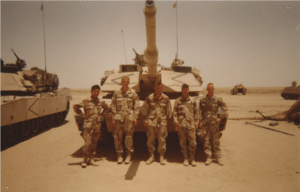 In the mid/late ’90’s I was an officer in the U.S. Army. (That’s me with the other officers in my company in Kuwait) The Army was where I got my first taste of leadership. At the time, I was only 23 and was very new to tanks. I would even say that I was the most inexperienced tanker in the unit, and yet I was the “leader”. What exactly did I bring?
In the mid/late ’90’s I was an officer in the U.S. Army. (That’s me with the other officers in my company in Kuwait) The Army was where I got my first taste of leadership. At the time, I was only 23 and was very new to tanks. I would even say that I was the most inexperienced tanker in the unit, and yet I was the “leader”. What exactly did I bring?
I remember a gunner in my platoon, who was a rising star. He was a dedicated soldier, but struggled to perform well on tank gunneries (i.e. annual performance finals for tankers) because of some level of indifference of his crew. I brought him onboard my tank, and together we ran a tight ship (or tank). While together, he was able to score the top gunnery score of the unit. For me, it was nice to achieve the high score of the unit, but for him, it was a positive turning point of his career. In reflecting on what a leader “does”, it occurred to me that the leader makes the people around him (or her) better.
While I was platoon leader, I also had the unenviable task to maintain order in the unit. If people were late to formation, I had to discipline them. If people engaged in conflict, I had to act as the mediator. If people got a DUI and went to jail, I had to bail them out. All this was challenging to some degree, but the most difficult was the fact that if you discipline other people for tardiness, that means you can’t be tardy yourself. This goes for everything that you are holding the unit members for; you had to be the exemplar in order to have the moral basis to demand that of others (for the good of the unit).
So as a result of my leadership role, I became more disciplined to shaping he person I am to become. For anything I demanded of others, I had to first hold myself to a higher standard. There were many things that were difficult for me. I was afraid for example, leading the unit on a night march; what if I got everyone lost? I had to overcome that fear. I had to work on myself in many dimensions. I had to work harder on myself than the other soldiers of the unit. I can sense that the soldiers expected this of their leader and respected this. The leader holds him or herself to higher standards.
Overtime, as one holds oneself to higher standards, one begins to grow. Big problems that used to give me giant headaches seems, the second or third time around, to be routine and manageable. Then…you outgrow your current circumstances, and are given more responsibility; you are promoted. The cycle starts again, you are challenged to become even more “exemplary”. This is the “inner work” that leaders must engage in. It is the driver of one’s leadership.
As you work on yourself and grow, you are likely to be given more responsibility for people. As a platoon leader, I was in charge of four tanks and 16 solders. I had the time to really be a positive influence to my gunner. When I was promoted to executive office of a company, my company was 350 soldiers. There will be no way to pay individual attention to everyone, but as a leader, you are responsible for the development of people. You are called upon to “care” for more and more people. This is the “outer work” that leaders must engage in. It is the impact of one’s leadership.
There’s a tendency in examining leadership to focus on the “outer” part of leadership. Indeed the outer part of leadership is necessary. However, fewer people pay the same amount of attention to the “inner” part of leadership. Without the inner part of leadership, one’s outer part will not progress. The two parts work in tandem; one part prompts growth and change in the other.
“Everyone thinks of changing the world, but no one thinks of changing himself.” ~ Leo Tolstoy
